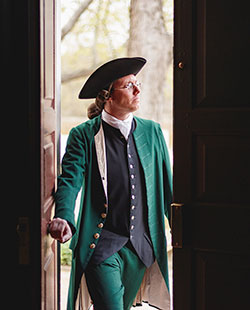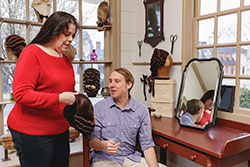Page content
Becoming George Mason
The quiet contributions of a reluctant Revolutionary are woven into stories told in the Historic Area
by Nicole Trifone
Photography by Darnell Vennie
When guests to the Historic Area recount what they know about George Mason, they can often point to only one document — albeit a very important one.
Much of the language and many of the principles found within the pages of the Virginia Declaration of Rights he authored can be seen in the Declaration of Independence and the Bill of Rights.
Joe Ziarko — the man portraying Mason, Colonial Williamsburg's newest Nation Builder — believes this all-but-forgotten Founding Father deserves recognition beyond that landmark 1776 document. Mason had a crucial voice in the political discourse of the Revolutionary era, and Ziarko is heartened that nearly every guest he encounters makes the same request: Tell me more.
"For me, it's wonderful to start with that blank slate," Ziarko said. "When our conversation ends, I hope guests understand the massive influence he had on his better-known countrymen. I can only hope and strive every day to do him justice in that."
Older than fellow revolutionaries Thomas Jefferson and James Madison, Mason served a pivotal role as a bridge between generations. Like the younger generation of Virginia dignitaries, Mason was inspired by Enlightenment ideals of freedom and equality, but he also valued many of the doctrines on which the British government and therefore Colonial governments were built. He believed that embracing elements of the British constitution provided the Colonies justification for their dissent.
"George Mason was an essential voice during that time period," said Ted Maris-Wolf, Colonial Williamsburg's vice president of Education, Research and Historical Interpretation. "He was a moderate voice among the Founders and he often spoke for people who weren't always considered by the more privileged and formally educated Thomas Jeffersons and James Madisons of the Revolution."
Mason's values are inextricably linked with his dedication to his large family; he and his first wife, Ann Eilbeck, had nine children who survived past infancy. In his will, he advised his sons "to prefer the happiness of independence and the private station, to the troubles and vexations of public business" — a sentiment he expressed repeatedly throughout his life. However, he also urged an adherence to a sense of duty to country. He said they should assert "the liberty of their country, and [endeavor] to transmit to their posterity those sacred rights to which they themselves were born."
In Mason, Ziarko sees a reluctant leader, compelled into the public life by his own intelligence and strong opinions. Mason griped about being summoned to the 1787 Constitutional Convention in Philadelphia but then became one of the most frequent speakers at the gathering, which ended in his dramatic refusal to sign the Constitution. "[I] would sooner chop off [my] right hand than put it to the Constitution as it now stands," he proclaimed.
"Mason was a Founding Father who really did mean it when he said he preferred his home life," Ziarko said. "He was always happy to relinquish power, yet his intellect and insight were demanded by his countrymen time and time again. He obliged, but it was no secret that he disliked leaving home."
During one of Mason's extended retreats into his own private life at Gunston Hall, Jefferson penned a letter to Madison about Mason's silence on whether the country needed a stronger federal constitution: "Is he determined to sleep on, or will he rouse and be active?"
As we now know, Mason repeatedly chose the latter.
Much like other Nation Builders, Mason is portrayed at a range of ages for a variety of Colonial Williamsburg programs. Ziarko, 32, has shown audiences a 25-year-old Mason on the cusp of getting married and a 51-year-old Mason in conversation with a young Thomas Jefferson to compare their famous declarations. Ziarko relies on his physicality to portray Mason's sense of duty — familial and political — and his status as an elder statesman. He uses a cane, carries a weary demeanor and offers a slight smirk instead of a toothy smile to show both Mason's physical shortcomings and his aversion to public life.
Ziarko's portrayal shows that just beneath Mason's curmudgeonly surface is a clear determination to serve the country using his best asset — his mind. Mason might rush through small talk, but he cannot resist a larger philosophical discussion. He might not have a taste for flowery language, but he cannot help but put his pen to paper when liberty is at stake. He might prefer the company of his own family, but he will join his fellow Founding Fathers to protect the rights of families throughout the country.
Ziarko was hired last summer to portray Mason after completing a two-year stint at George Washington's Ferry Farm in Fredericksburg, Va. But he is not a new face among Colonial Williamsburg's interpreters. From 2010 to 2014, he portrayed Edmund Randolph, another oft-overlooked figure from the American Revolution who joined Mason in refusing to sign the U.S. Constitution.
Ziarko's professional career in historical interpretation technically began five months after his 2007 graduation from Dickinson College in Pennsylvania, where he majored in history and theater. His first unofficial gig as a Nation Builder, however, came long before. In the fourth grade, he dressed up as Thomas Jefferson for a class assignment.
"You can trace back my love for theater and history, and specifically this time period in American history, to that assignment," said Ziarko, who also participated in fur trading re-enactments as a youngster in his hometown of Hiram, Ohio.
When Ziarko struggled with how to reconcile his seemingly contradictory passions for history and theater after college, he remembered not only that prescient fourth-grade project but also his family vacations to Williamsburg, where he learned from tradespeople and enjoyed theatrical performances in the Historic Area.
"Colonial Williamsburg always stuck with me," Ziarko said. "It was a seed that had been planted when I was young, even if I wasn't entirely aware of it. Then one day, there was this fully realized path for me that was actually there all along."
The addition of George Mason to Colonial Williamsburg's Nation Builder program is generously funded by Ms. Brooke England and retired Federal Chief Judge Paul Michel.
Did You Know?
- Though respected for his knowledge of law, George Mason did not receive a formal education, was not a lawyer and made his living as a planter.
- Mason argued against the institution of slavery — "[slavery is a] slow poison," he wrote — but owned slaves, none of whom he freed.
- In his draft of the Virginia Constitution, Mason proposed that voting rights extend to any man who had three or more children. Mason, who fathered nine children with his first wife, Ann Eilbeck, believed an investment in the Nation's future shouldn't be tied only to property.
- A marriage agreement between Mason and family friend Sarah Brent, his second wife, protected her property if Mason died before her.
Where to Find Mason
George Mason may have preferred his life at Gunston Hall, but the new Nation Builder can now be found strolling through the Colonial capital.
Mason, as portrayed by
Joe Ziarko, will talk with fellow Founding Fathers Thomas Jefferson and James Madison in A Difference of Opinion on the Charlton Stage. He can also be found regularly visiting the homes of George Wythe and Peyton Randolph, as well as the Raleigh Tavern's Apollo Room.
Guests can track Mason's location on their smartphones by downloading the Colonial Williamsburg Explorer app.


